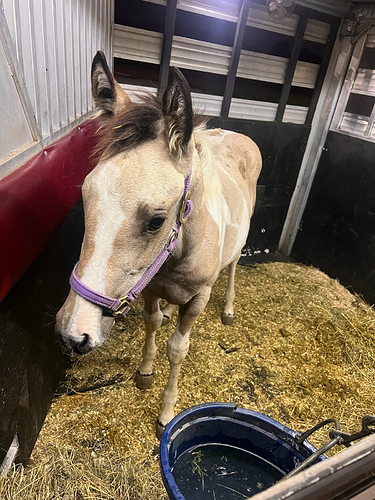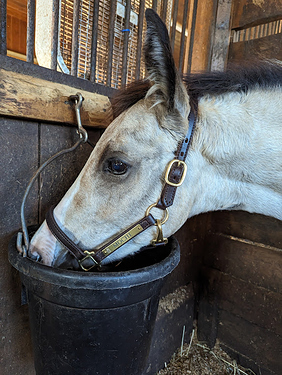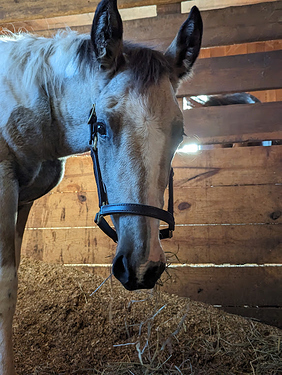Your horse. Your trainer. Your money. :
You want your money well spent. But it’s your money and your horse.

Before you buy anything, talk to the trainer/manager of the farm and find out about their program and what they supply or are willing to. You might find out they know what they are doing in regards to bringing up baby since that’s their business.  Talk first, shop later!
Talk first, shop later!
I was totally going to ask if it’s possible to overdose on it since it’s fat soluble and 8000 sounded like a LOT 
I spoke with the trainer today and she’s actually already intending on speaking to the vet’s nutritionist about OCDs and vitamin E, and asked me to find out from the breeder what Mochi has already been getting + what kind of grass she’s on so she can adjust accordingly and gameplan with the nutritionist.
Apparently, the vet - who is also actually the vet I used for my last horse - said that “you can’t heal a vitamin E deficiency” and that you can give them as much as you want, but it’s really dependent on the mare’s intake during her pregnancy/nursing and early, early on the foal’s life.
The trainer did say that of course vitamin E is pretty cheap, so that’s why she’d like to speak to the nutritionist further about it plus best ways to avoid OCDs. She said she feeds Nutrena and ProElite Performance but is worried about the latter causing too much growth too quickly and leading to OCDs.
Would love to hear all your thoughts on this - I’ve never heard of a deficiency not being able to be cured!
Other than that, though, I asked how involved I could be and she said I’m welcome any day, any time except Mondays (barn is closed). 
It’s absolutely possible to OD on E. It starts interfering with other fat-soluble vitamines like K and A, and can start causing bone density issues 
You CAN heal an E deficiency, depending on the details, and no, you can’t just give as much as you want (see above)
What you can’t automatically fix is an E deficiency so severe (low enough, long enough) that it’s caused irreversible neurological damage
any regular feed, fed at 4-8lb or more a day, can potentially lead to DOD issues simply by providing too many calories. Keep her lean (lower calories) but never ever sacrifice nutrition in the process
Today I learned…
I have been feeding much more E than I intended because I didn’t realize that about the scoop?!
Following this one because I’m in a similar situation having just bought my first baby!
It is SO FUN!
As an adult amateur, I brought a weanling home and existed without Professional Supervision with her for several years  Here are some of the things I thought I knew beforehand (and did! yay!) but then the things I never thought I’d learn along the way:
Here are some of the things I thought I knew beforehand (and did! yay!) but then the things I never thought I’d learn along the way:
No time is wasted. Be patient. Don’t rush. Repeat the thing with grace and understanding. Rather than approach a horse and assume, for example, that it has been flysprayed before and knows what a spray bottle is: you assume they know nothing. Approach everything as a mildly amusing/entertaining adventure to enjoy. No stress. No fuss. No excitement. Just patience and repetition.
Leading (and trusting you to follow your lead) is one of the skillsets that will pay dividends. She’s a little worried about something but she trusts you when you lead her? Walking into strange places? No problem. Loading? No problem. Scary horse-eating whatever-you-finds? No problem. I cannot emphasize this enough: leading (not just meandering around but purposeful walking/halting/change of directions) is really beneficial in the long-term.
The world is an adventure. Rather than be terrified of that fact, enjoy it. There is a training video with Klaus Balkenhol strolling through a pasture of young horses with an umbrella. They are fascinated and curious, a little leery but not scared. Explore the world with your young horse. Every potentially scary thing is also a potential experience for positive reinforcement. Explore the feed bag. Explore the umbrella. Lay the foundations of you not being afraid of things and helping foster an attitude of curiousity/exploration rather than “oh my word, the world is out to eat me”.
Let her be a horse. As much turn-out as possible (mine was out 24/7/365 for 3 years) with an appropriate group of horses, if possible. Horses (of all ages) benefit from these things, and it’s doubly important with young horses who are still developing. As other posters above have mentioned: do not overfeed. Don’t jump straight into grain with a young horse, hay and a good ration balancer (I used what someone above mentioned, buckeye’s gro n win). Lean isn’t skinny. Resist the urge to (either yourself, or let a program) chunk her up if there’s the desire to fit a certain “look” (e.g. are they chasing the rounder/fuller shape as a 2yo for the in-hand classes).
Babies are darling: they’re cute, they’re fun, they’re personable, and it’s a brand new world with them. Don’t give them a pass on being mannerless, but understand that they’re working without parameters at first. Set boundaries and enforce them in appropriate ways. I was, for the first year, fetching mine out of her herd of 7 and everyone quickly learned that crowding the human (or otherwise trying to play reindeer games with me) was not appropriate. Body language was more than enough to get the point across. They’re clever and they learn fast. Young horses can (and should) be expected to respect personal space, lead well, stand (yes baby goldfish attention spans but they can stand still for just a little, gradually increasing in time) plus standard handling/grooming requirements so that any work you, a trainer, a farrier, or a vet might need to do will never be a fight.
All of this is a very longwinded way of saying: Have fun. Have a sense of humor. Be patient. You can’t plan or anticipate for everything (believe me, I tried…  ) so do the best you can, and make sure you have a good team of people on your side (vet, farrier, property owner, et cetera).
) so do the best you can, and make sure you have a good team of people on your side (vet, farrier, property owner, et cetera).
is she being wormed on a regular schedule? weanlings should be started on worming at two months
as for feed we have had excellent results using Nutria Mare & Foal, our feed store Was special ordering it for us but now stocks it as others have begun using it.
as for showing a young horse, they can surprise you as how matter of fact they can accept being exposed to all the craziness of a being put in with a thousand horses, to being just another day in the pasture attitude
Baby Mochi was picked up yesterday and is due to arrive tomorrow morning! I’m SO excited… when I went to visit her she was very much still a baby (just shy of 2 months old) and very much had “stranger danger” but the breeder does a lot of socializing and has told me that everyone who’s interacted with her thus far has absolutely loved her. Can’t wait to have my therapeutic grooming time back.
So cute, I remember her! You’ve gotten great advice here but I will say if she can be out as much as possible that would be best! I bought a weanling two years ago and it is SO much! And the time FLIES! I can’t believe mine will be 3 already next June! Regarding the vitamin E, my vet advised that a liquid vitamin E was better absorbed but I highly recommend supplementing it as we found out that my baby had low vitamin E levels when he was about a yearling and I’ve been using it ever since.
Do you mind sharing what young horse program she’s going to? I think I may know and can help with any questions. Feel free to PM me!
Yes, the liquids - Emcelle, Nano-E, Elevate W.S. - ARE better absorbed. But unless there’s a deficiency, or a horse shows he needs that type to maintain a normal level, they aren’t needed, and the price is a little up there. Emcelle is the cheapest by far at $.24/1000IU, the next one is double that though I forget which of those other 2 it is. UltraCruz Natural E is $.13/1000IU for comparison. But if 1000IU of Emcelle does the job that requires 2000IU of UltraCruz, then… 
This is SO important! In most cases they don’t know what you want or what they should do. Be fair.
Good to know about the liquid vitamin E, thank you for that!!
I definitely don’t mind sharing since I guess it’ll probably be pretty obvious come show season next year, lol - she’ll be going to Drew Taylor’s, who is thankfully local to me. 
How did you find out yours had low vit. E? Wondering what (if any) sort of vetting I should do, if even to have a baseline (ie, lyme?)… it’s so hard to know what’s actually worthwhile taking note of or not, since so much can change with them growing!
The more you can handle them at this age, the better. This means not just grooming and leading but introducing clippers, the horse trailer, and showing her scary things… taking her places with a buddy horse, teaching her to tie. Have fun! That’s a precious age. Actually my favorite age… they get a bit more mischievous as a yearling. Fillies are lovely and tend to be more serious than the colts, who think everything is a toy.
Do watch for offering to kick. They are babies after all and they do kick. My colt never offered to kick until one day he was feeling good and galloped by and kicked out and caught my leg, leaving a big bruise. He’s never offered it again and I doubt he did it on purpose, just a feeling good kick and I was in the wrong place. My worst kick was by a yearling who came up facing me looking for cookies. When she saw I didn’t have any, she spun around and kicked me in the stomach. She was angry I didn’t have food. And it was so quick, I didn’t see it coming. But usually you correct the behavior (especially as babies) and they never try it again.
Oh she’s beautiful! I’m even more excited now for my weanling who is arriving Friday.
Well, she arrived on Saturday and is SO DAMN TINY AND CUTE!!! 
Hoping to get some more advice from you all.
It seems she had never been dewormed and is sadly pretty wormy, but the barn gave her some dewormer yesterday… she came with a pretty big belly. Is this common for young ones (or for breeders to not deworm)? Kind of embarrassed about it!
She’s super chill and just wants to eat. As in, that’s all she’s interested in - I’ve tried to give her scratches/groom her in her stall a couple times and she tolerates it for a few seconds before circling and moving away, and if I keep at it she turns her butt towards me (but doesn’t get an attitude if I push it back away). The only time she’s threatened to kick is the one time I touched her belly, which I suppose probably doesn’t feel great if she’s wormy. If I try to hold her by the halter she definitely gets some sass about it. If I just sit in her stall she just eats, doesn’t come over to interact or anything. Her breeder told me she has a bit of “stranger danger” and “is fidgety around new people”, which is totally accurate lol… I haven’t found any itchy spots - she seems to kind of like her neck/chest being scratched but still moves away after a minute or so.
I don’t want to push/force anything. Should I keep trying to groom? Or just hang around her until she seems more interested? Or just leave her be for a few weeks, let her get settled in, and/or let the trainers handle her for a little while before I come in? They’ve said she’s been great and has a nice disposition.
First, OMG, how CUTE!!!
Determined how? Seeing worms in her manure?
what product and at what dose?
Sadly, yes, common, and such a terrible disservice to the foal 
Remind me how old she is?
As for her behavior - Give her a few days of doing her own thing, but hang around and do interesting things without asking her to be involved. Let her get curious about you. If she likes a good neck scratch, but is done after X time, then you be the one to end the session in half of X time. Leave her wanting more.
Yep, they said they saw some the day before and gave her the dewormer yesterday morning.
Not sure what product or dose - didn’t ask!! This barn only does babies, though, so I trust whatever they gave her. They didn’t seem super surprised or perplexed that she was wormy, so I figured it was somewhat common, but still super sad and embarrassing!!
She’ll be 5 months old tomorrow.
Love this!! Good idea. She doesn’t get super into scratches when I do find a spot, just kind of stands still for longer, but I like the idea of hanging around and letting her be curious about me.
If she does turn her butt towards me or threatens to kick, should I just let it go for now? If I should get after her, to what degree?
I appreciate your (and everyone else’s) help!! The trainer is super nice but I have a feeling a lot of people just send their babies to them and aren’t super present, and I’m trying to not be an overbearing crazy boarder. 
I wonder if you could ask some of these questions to the trainer too? Obviously we love babies here and there are many knowledgeable people - but if they handle xyz one way at the farm, I’d think consistency would be good for your girl!



